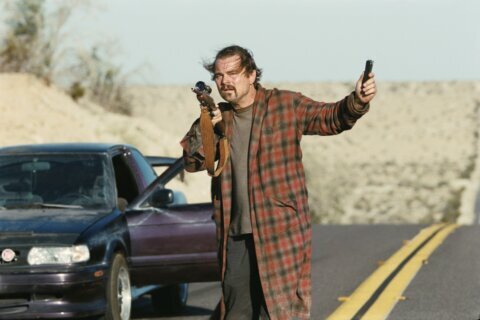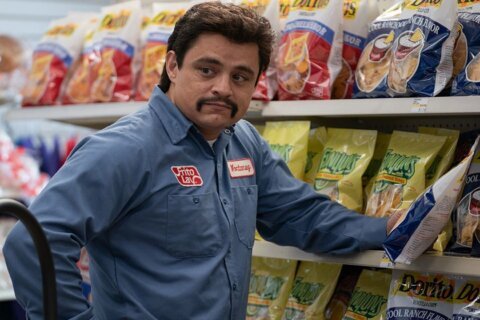WASHINGTON – When Hattie McDaniel became the first African American to win an Oscar in “Gone With the Wind” (1939), it took her forever to get up to the stage because she was seated so far in the back of the room, a Rosa Parks for the red carpet.
My, how things have changed.
This year could be “The Oscar Race about Race” with a string of race-based contenders, from Brian Helgeland’s “42” to Ryan Coogler’s “Fruitvale Station” to Lee Daniels’ “The Butler.” Now, we can add Steve McQueen’s “12 Years a Slave” to the mix — the hardest to watch of this group, but also the hardest to forget.
Based on an autobiography of the same name, the film follows the true story of Solomon Northup, a free black man, distinguished violinist, husband and father of two in Saratoga Springs, N.Y. His life changes on a dime when he’s drugged and kidnapped in Washington, D.C., sold into slavery with the new name “Platt,” and passed from plantation to plantation in Louisiana from 1841- 1853.
Like its Best Picture rival “Gravity” (2013), “12 Years a Slave” excels most in its unblinking directorial vision and existential crises born by powerhouse performances. John Ridley’s script almost becomes secondary to the shattering visceral experience. You’ll ask yourself: how can so much visual beauty — nature, rivers and fields — share the screen with such sad eyes and heart-wrenching faces?
The most powerful of these belong to lead actor Chiwetel Ejiofor, a name you may not know, but a face you’ve seen everywhere. He made his feature film debut in Spielberg’s slave ship tale “Amistad” (1997), got glowing reviews for “Dirty Pretty Things” (2002), earned Golden Globe nominations for “Kinky Boots” (2005), “Tsunami: The Aftermath” (2006) and “Endgame” (2009), shined in the ensemble casts of “Love Actually” (2003), “Children of Men” (2006) and “American Gangster” (2007), and won an Independent Spirit Award in “Talk to Me” (2007). In “12 Years,” Ejiofor’s central performance is so raw that he could very well beat Tom Hanks (“Captain Phillips”) for Best Actor.
Of course, Ejiofor benefits from a supporting cast that’s nothing short of brilliant. The conversation begins with Solomon’s two plantation “masters” in a sort of “good cop/bad cop” dynamic brought to life by Benedict Cumberbatch (British TV’s “Sherlock”) and Michael Fassbender (“Prometheus”), respectively. The former oversees Solomon’s slave labor first in the sugar cane fields; the latter rules with an iron fist in a twisted form of Bible-thumping in the cotton fields.
What a year it’s been for Cumberbatch, who played Khan in “Star Trek: Into Darkness” (2013) and who plays WikiLeaks founder Julian Assange this week in “The Fifth Estate” (2013). In “12 Years a Slave,” Cumberbatch gets a more sympathetic role, taking a liking to Solomon and giving him a violin like the harmonica in “La Grande Illusion” (1937). Still, his outward kindness is but a mask for the coward underneath, stemming from a mindset that still views humans as property.
As for Fassbender, he’s the true monster of the movie, priding himself on being a “n—– breaker,” the type of merciless, power-hungry character we haven’t seen since Ralph Fiennes as Amon Goeth. It’s Fassbender’s third time working with McQueen (“Hunger” and “Shame”) and it may be his best. His sexual bullying of a young slave Patsey (Lupita Nyong’o) creates a fascinating dynamic between Fassbender and his jealous wife (Sarah Paulson, “Game Change”), whose searing eyes are ever watching from the plantation porch. He also offers a subtle touch of leaning on the heads of his slaves. I’d be curious to hear whether this was in the script or the product of a brilliant actor’s choice.
Paul Giamatti and Paul Dano are equally sadistic in smaller roles. The two Pauls prove they’re two of the best supporting actors working today: Giamaitti the seasoned veteran still searching for an Oscar after “Sideways” (2004) and “Cinderella Man” (2005), and Dano the rising talent already overdue after “Little Miss Sunshine” (2005), “There Will Be Blood” (2007) and “Prisoners” (2013).
On the supporting actress side, you may recognize Alfre Woodard, who earned an Oscar nomination for “Cross Creek” (1983) and won four Emmys for TV’s “Hill Street Blues,” “L.A. Law,” “Miss Evers’ Boys” and “The Practice.” In “12 Years,” she plays a tragic figure who gladly prostitutes herself as a way of avoiding the cotton fields. Also look for little Quvenzhane Wallis, last year’s Oscar nominee for “Beasts of the Southern Wild” (2012), in a brief appearance as Solomon’s daughter Margaret.
Just when you thought the film couldn’t get any more star-studded, Brad Pitt shows up in the final 20 minutes as a Canadian carpenter. The man sitting next to me in the theater had obviously not seen the trailer and turned to his friend with “World War Z” joy: “Hey, that’s Brad Pitt!” Damn right it is. Pitt’s acting chops may pale to contemporaries like Daniel Day-Lewis, but he’s shown an ability to choose the consequential films of his time: “Thelma & Louise” (1991), “A River Runs Through It” (1992), “Legends of the Fall” (1994), “Twelve Monkeys” (1995), “Se7en” (1995), “Fight Club” (1999), “Snatch” (2000), “Ocean’s Eleven” (2001), “The Curious Case of Benjamin Button” (2008), “Inglourious Basterds” (2009), “The Tree of Life” (2011), “Moneyball” (2011) and “12 Years a Slave” (2013).
Pitt has fought white supremacists before in Tarantino’s “Bastereds,” but if last year’s “Django Unchained” was the “Inglorious Basterds” of American slavery, “12 Years a Slave” is the “Schindler’s List,” with unforgettable images of man’s inhumanity against man, dehumanized, stripped naked, whipped, beaten and hanged. “12 Years” will prove more controversial than “Schindler” because it’s not a foreign people incarcerated in Nazi concentration camps, but rather a familiar people slaughtered right here in our own backyard. It will also prove far less accessible to the masses, lacking any shred of Spielbergian sentimentality. There are no black-and-white girls in red coats, no Ben Kingsley tearjerker typewriters, no inspirational Liam Neeson “I could have done more” speeches.
As a director, McQueen has a much colder vision, and the result is decidedly more depressing. He may share his name with a famous Hollywood actor, but his style is far from Hollywood. And while the American actor McQueen may be remembered for “The Great Escape,” the British director McQueen allows us none. In fact, he makes us feel guilty for eating popcorn with such sickening violence unfolding on screen in front of us.
McQueen admits he was inspired by the French New Wave and has thus become a darling of the Cannes Film Festival, where he won the Golden Camera for first-time director in “Hunger” (2009), a tale of the 1981 Irish hunger strike. His sophomore effort “Shame” (2011) explored sex addiction in New York City and was equally acclaimed, winning the top prize at the Venice Film Festival and being named of the year’s Top Ten Independent Films by the National Board of Review.
“12 Years a Slave” bleeds with the touch of someone who got his bachelor’s degree in Fine Art and worked as a video artist before becoming a director. Each frame resembles a finely- crafted painting with gorgeous compositions by cinematographer Sean Bobbitt (“Hunger,” “Shame”), capturing the dark underbelly of Norman Rockwell, with a wide-shot staring at a group of slaves all in a row, or a high-angle camera looking down over a horse-cart of slaves in the fetal position.
When he occasionally goes for a more complex shot, he nails it, whether the camera is pushing through the fields like David Lynch through the “Blue Velvet” grass, watching from beneath a churning ferry boat rudder, or rising from Solomon’s dungeon window to reveal the Washington, D.C., skyline. All the while, his soundtrack is a mix of Hans Zimmer’s musical score and classic negro spirituals, with offensive plantation lyrics brilliantly overlapping church sermons.
McQueen’s greatest asset is the long-take, forcing us to experience every lash of the whip right with the characters. If I have one complaint, it’s that McQueen displays a “Passion of the Christ” blood thirst, leaving us watching through parted fingers. I suppose this is the point, with the most powerful whippings since LeVar Burton in “Roots” (1977) and Denzel Washington in “Glory” (1989):
While the whippings are chilling, the most effective long-take comes during the most powerful lynching I’ve ever seen on film. With Solomon’s neck in a rope, his body dangles just low enough to the ground that his toes barely touch the grass, keeping his neck from snapping. Rather than cut away, McQueen watches. And watches. And watches. We the viewers feel as if we’re going to suffocate.
After watching such scenes, you’ll never look at “Gone With the Wind” the same again. Scarlett O’Hara may have declared, “I’ll never go hungry again” and “You should die of shame to leave me here alone,” but the director of “Hunger” and “Shame” wants to tell the other side of the story. He asks us to consider the countless nooses hanging off-screen in Tara’s shadows, as Scarlett raises her fist against orange skies that may as well be Jean Toomer’s “Blood Burning Moon.”
I say all this as a guy who considers “Gone With the Wind” one of his favorite movies. To dismiss it as equally bigoted as “The Birth of a Nation” (1915) is an overstatement and to discount its place in cultural history would be a profound mistake. “GWTW” is a benchmark of Hollywood’s Golden Age, offering one of the great “making of” stories in history, a pair of timeless lovers (Rhett and Scarlett), dialogue that has entered our vernacular (“Frankly my dear, I don’t give a damn”), music that has entered our memories (Max Steiner’s “Tara’s Theme“), and that rare breed of mainstream box office smash (the highest grossing film of all time) and critical acclaim (winning 8 Oscars). When the AFI ranked it the No. 6 Greatest American Movie of All Time, Martin Scorsese rightfully called it “the best production of the Hollywood studio system of the first half of the century.”
But for everything “Gone With the Wind” got right, it’s important to remember the darkness it sugarcoated. Solomon Northup published his autobiographical account in 1853. That means he endured these real-life atrocities at the same time the fictional Scarlett was wooing plantation beaus in lavish dresses. Nostalgia is natural, and in tumultuous times, we almost instinctively channel Rhett, searching for something left in life of charm and grace.” But when it comes to mankind’s ongoing understanding of itself, “12 Years” reminds us that certain things, like Civil Wars and the American slave trade, are best “gone with the wind.” America is still dealing with the scars.
★ ★ ★ ★
The above rating is based on a 4-star scale. See where this film ranks in Jason’s 2013 Movie Guide. Follow WTOP Film Critic Jason Fraley on Twitter @AboveTheJFray, read his blog The Film Spectrum or listen Friday mornings on 103.5 FM.
Follow @WTOP and @WTOPliving on Twitter.








